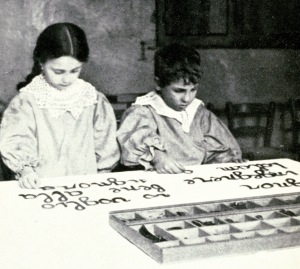The Moveable Alphabet
A trainer once asked my classmates and me the following: "If you were on a deserted island and could only take two Montessori materials with you to support a child's intellectual development, what would they be?" We pondered, debated, and finally concluded that for math it would have to be the Golden Beads that represent the decimal system and for language it would be the Moveable Alphabet.
The Moveable Alphabet was developed by Dr. Montessori when she realized that children had the mental capacity to analyze the sounds in words way before they could synthesize them. The former is what we do when we write, while the latter is how we read. During a child's first year in a Primary environment, we spend a lot of time playing Sound Games, which help children understand that words are composed of sounds. Around their third birthday, we start introducing the Sandpaper Letters - individual letters cut out of sandpaper and glued on wooden boards - which is how children learn what sound each letter makes and how the letter is written.
In a genuine Montessori environment, we NEVER refer to a letter by its name, because we are preparing the child to write and read. Think about it: when you write or read the word "cat", you are saying [c]-[a]-[t]... You are NOT reading "cee-ay-tee"!! So why teach the names of the letters? It's a testament to children's intelligence that they can learn to read in traditional environments where they have to be taught that "cee says [c]". Why confuse the poor children?
When a child writes a word with the Moveable Alphabet, he does so phonetically by analyzing the sounds he hears as he says a word slowly out-loud. Because English is not a phonetic language, many words will be misspelled. We never correct a child, nor do we ask him to read the word back to us, because they can't read yet! (Sometimes a child will ask you to read to him what he wrote; all Montessori teachers have hilarious stories of decoding phonetically written words... My favorite is "wnsupnetaim", or "once upon a time".)
Eventually, after weeks and weeks (and sometimes months) of using the Moveable Alphabet, the child will start reading the words back spontaneously (and that's when you leave the room, shed a tear of joy, send a quick thank you up to Dr. Montessori, and do a happy dance). And later on, perhaps when the child is five or six years old, he will become curious about correct spelling, and you can guide him in his new awareness. But only when he's ready.
Check out The Very Montessori blog, where you can see several examples of pre-schoolers writing with the Moveable Alphabet.
The Moveable Alphabet was developed by Dr. Montessori when she realized that children had the mental capacity to analyze the sounds in words way before they could synthesize them. The former is what we do when we write, while the latter is how we read. During a child's first year in a Primary environment, we spend a lot of time playing Sound Games, which help children understand that words are composed of sounds. Around their third birthday, we start introducing the Sandpaper Letters - individual letters cut out of sandpaper and glued on wooden boards - which is how children learn what sound each letter makes and how the letter is written.

In a genuine Montessori environment, we NEVER refer to a letter by its name, because we are preparing the child to write and read. Think about it: when you write or read the word "cat", you are saying [c]-[a]-[t]... You are NOT reading "cee-ay-tee"!! So why teach the names of the letters? It's a testament to children's intelligence that they can learn to read in traditional environments where they have to be taught that "cee says [c]". Why confuse the poor children?
When a child writes a word with the Moveable Alphabet, he does so phonetically by analyzing the sounds he hears as he says a word slowly out-loud. Because English is not a phonetic language, many words will be misspelled. We never correct a child, nor do we ask him to read the word back to us, because they can't read yet! (Sometimes a child will ask you to read to him what he wrote; all Montessori teachers have hilarious stories of decoding phonetically written words... My favorite is "wnsupnetaim", or "once upon a time".)
Eventually, after weeks and weeks (and sometimes months) of using the Moveable Alphabet, the child will start reading the words back spontaneously (and that's when you leave the room, shed a tear of joy, send a quick thank you up to Dr. Montessori, and do a happy dance). And later on, perhaps when the child is five or six years old, he will become curious about correct spelling, and you can guide him in his new awareness. But only when he's ready.
Check out The Very Montessori blog, where you can see several examples of pre-schoolers writing with the Moveable Alphabet.
Categories
- 3-6 (8)
- 6-9 (26)
- 9-12 (8)
- Positive Discipline (2)
- Conscious Parenting (12)
- Montessori Curriculum (9)
- Preparation of the Adult (14)
- Preparation of the Environment (11)
- Montessori Principles (11)
- Montessori Homeschooling (20)
- Language Arts (3)
- Math (3)
- Geography (2)
- Biology (1)
- History (2)
- Practical Life (1)
- Montessori Stories (4)

9 comments
Leave a comment